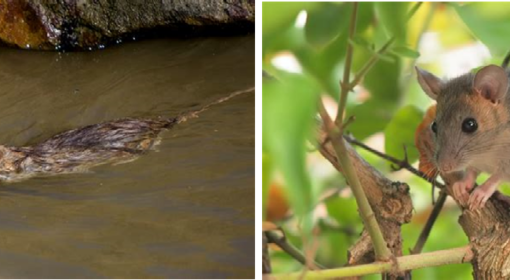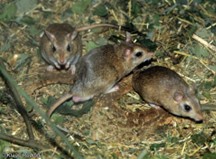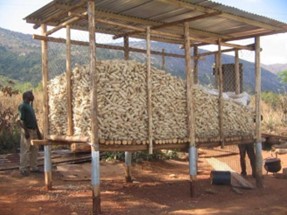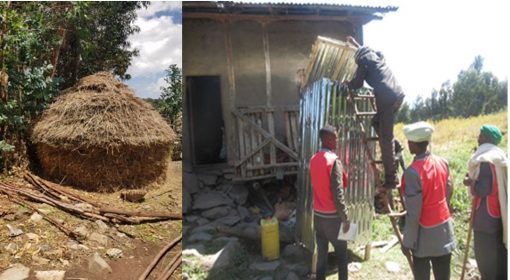By Kübra Elmas, Rukiye Oca, Luwieke Bosma and Sukru Esin
Rodents are a big problem for farmers in Turkey as well as everywhere else. We met with different farmers in the Harran plains part of the Anatolia region in Southeast Turkey, who encounter rodents in almost every season of the year, wondering how these animals affect their daily lives and farming lives. We started by listening to their stories about rodents. Some of them shared about the severe damage rats cause to the crops, some say they reproduce too quickly, too quickly for humans to cope. During the interviews, we come across a very interesting comment, one of the farmers says that during the tillering period in wheat and barley, rodents especially prune the plants by gnawing, and this causes an increase in yield. Which we found very interesting.
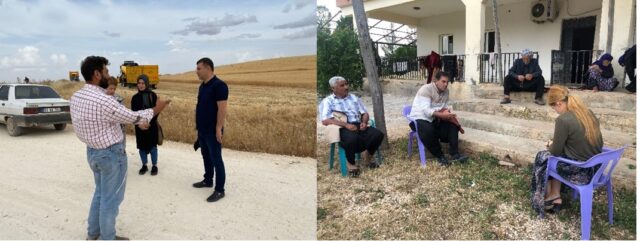
During our visit to the village of Kuskunlu, Mr. Emin, who is 90 years old and known as a scientist in the village, tells us very interesting anecdotes about rodents. First, he reported that rats like homemade butter (Urfa Sade yağ) very much, and then he added that they use this information and put butter on poisonous bait to kill them in this way. Also, we learned from Mr. Emin that rats love apples and that they put poison on the apple and leave it where the rats are. While preparing the poisonous bait, they were careful not to touch it with their hands, according to the information they obtained from their elders. When we ask why, he says these animals have a sense of smell and do not like human smell.
Our farmers in Urfa, Turkiye state that rodents especially cause damage in rainfed agriculture with crops like wheat, barley and lentils. While also in warehouses and home environments considerable damage is witnessed. Rodents generally cause damage by eating seeds of cotton, corn and barley during the 2nd and 3rd irrigation periods. Farmers who grow wheat on their fields state that rodents cause damage mostly in winter. In cereals, they cause most damage during the tillering stage. Rodents are generally seen at all times of the year, but the months when their populations are most intense are reported as March-April. They state that they see more Rattus norvegicus in the summer months. According to a few of our farmers, rodents are mostly found in moist soils with high organic matter content, explaining that they can live and reproduce more comfortably in such soil environments.
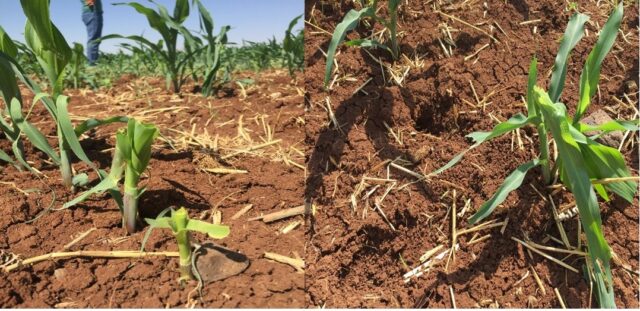
Rat damage in the field generally forms in clusters and is dealt with by the people in a collective manner. The household and their relatives would go to the field together and close the rat nests one by one with soil, and the next day, they would go again to the field and check the nests one by one and leave poisons bait in the nests with open holes. That’s how they detect active rodent nests in the field. Most greenhouse owners share they face less rodent problems, but that rats mainly cause damage by eating the outer covering of the plastic of the greenhouse and they gnaw the water pipes.
The presence of rodents in warehouses and confined space is mostly noticed by the faeces that they leave. The farmers stated that rodents gnaw the packages and grain sacks in the warehouses and eat the seeds inside, and they pierced the cotton sacks and got into the sacks. They also state that another damage they cause in warehouses is gnawing on plastic and drums.
According to the farmers, it is generally easy to detect the presence of rodents in the field through observing the holes of the rodent burrows in the field. It is possible to find rat nests around the damaged plant, and they reported that each nest has more than one entrance. They also observed that rats do not visit one nest twice, but they constantly open new nests, the farmers think rats do this for their own safety.
Another issue that worries the people in this region is the blind mole rat (Spalax leucodon). They reported that it’s difficult to detect their existence because they tunnel under the ground and do not come to the surface of the soil, and therefore it is very difficult to control them. The blind mole rat causes damage by eating the roots of grains, they report that they cause great damage especially to watermelon and tomatoes in this region. They emphasize that they are extremely resistant to the pesticides applied. According to an expert working in the region, the farmers, especially those planting vegetables, were having problems with the blind mole rat. In general, farmers report encountering voles (Microtus spp.) and large rats (Rattus spp.).
When we talk about the methods of controlling rats, we see that the farmers largely rely on chemical control. As pesticides, aluminium phosphite and zinc phosphide are mostly used. They tell us that plastic traps, hatch tubes, simpos (57% aluminium phosphide) are mostly used in the warehouses. Also, some of the farmers we interviewed consider the economic damage threshold when applying chemical pesticides, while some farmers do not pay attention and target the entire population. In general, spraying is done in the fields from January to February. First, they leave the poisonous wheat seeds in the nests in the field and then the next day they check them again. Some people state that they use coal dust and a gypsum-flour mixture in their barns and houses to control rats.
In the past, if it was noticed that there were mice in the adobe house, they directly covered the nests with wet mud. In this way, the animal was trapped and died inside the hole and there was no smell. Farmers also share their knowledge on the essences of some plants such as lavender and mint, that have a repellent effects on rats. Mr. Şehmus who is a farmer and also an expert working in this area said that once a farmer had a rodent problem in his pistachio barn, and he sprinkled the dry mint powder in the barn so that the animals did not come. Additionally, rodents like the taste of clover and licorice, but rodents do not like thyme, lavender, and mint plants at all, because the essences of these plants have repellent effects on rats.
In all these conversations, some of our farmers state that rodents contribute to the improvement of the soil by providing aeration of the soil, and some of rodents cause an increase in yield by eating the ears of wheat, especially during the tillering period. We thought at the beginning that the knowledge of farmers on controlling rodents would not be very high, but we were surprised to learn that farmers know so many different biological and ecological methods, and have passed on this information from generation to generation, and from family member to neighbour. Lastly, one farmer shared that in his opinion it would be much better to spread the measures against rodents over time for effective and sustainable management. Whereas another mentioned that these animals may be sensitive to colours.
Through our extensive interviews, it has become evident once again that rodents pose a significant problem, particularly in rural areas. We have also observed a heavy reliance on chemical pest control methods among farmers, leading to environmental pollution. However, given the extensive knowledge and experience of these farmers, there exists a promising opportunity to implement Ecologically-Based Rodent Management (EBRM) measures, which offer eco-friendly and sustainable solutions based on a profound understanding of rodent behaviour.
To address this issue, MetaMeta Anatolia is leading the MED4PEST project, a venture focused on combating rodents using natural methods together with Greek, Moroccan and Dutch experts. Currently, the project is being conducted in various regions of Southeastern Turkiye. Our objective is twofold: to minimize the environmental impact caused by chemical rodenticides and to provide farmers with innovative approaches to rodent control in their area.
We are committed to visiting this region regularly, collaborating closely with farmers to trial and refine different EBRM methods. We firmly believe that this endeavour holds great potential for success and will benefit the farmers in this area. The journey continues as we strive towards achieving our goals.

